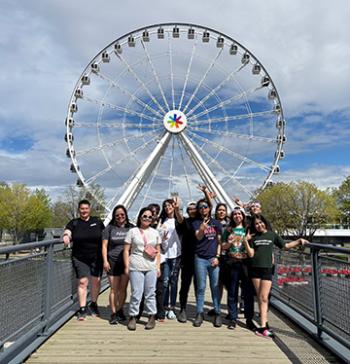Image Caption
Local Journalism Initiative Reporter
Windspeaker.com
Young Inuit hockey players are back in Newfoundland and Labrador following a memorable trip to Montreal.
Nine female players from the community of Nain, the northernmost permanent settlement in the province, returned home on May 10 following a six-day excursion.
The trip was sponsored in part by Air Canada and the Professional Women’s Hockey League (PWHL). Highlights included attending a PWHL playoff game on May 8, featuring the host Montreal Victoire and the visiting Ottawa Charge.
The Nain players, who range in age from 11 to 18, also had a meet-and-greet session with members of the Charge, whose roster includes two Indigenous players, defender Jocelyne Larocque, who is Métis, and forward Victoria Bach, a member of Mohawks of the Bay of Quinte in Ontario.
The group also had the opportunity to attend the Victoire morning skate on the day of the game.
Besides playing for various teams in their community, all of the players also attend Jens Haven Memorial School in Nain.
The school’s principal Julie Dicker served as one of the chaperones for the trip.
“I don’t think any of them had been to a pro women’s game before,” Dicker said. “A couple of them may have been to an NHL game.”
The Nain contingent also had time for plenty of sightseeing in Montreal.
The entire trip was documented by a film crew and will make up the first episode of the third season of Breaking Down Barriers, which will air on Crave on Sept. 30, the National Day for Truth and Reconciliation.
Saroya Tinker, a former pro player, is one of the hosts for Breaking Down Barriers, which spotlights those focused on fostering positive social change in hockey. Tinker is also the PWHL’s manager of diversity, equity and inclusion and community initiatives.
Dicker said all the players loved having a crew around filming their adventures throughout the city.
“I don't think they realize how big it is,” Dicker said of the athletes who travelled to Montreal. “They don't realize how much they really experienced until they come back home and get to reflect on what really happened because it was so busy every day. Our schedule was jam-packed, busy from morning until bedtime. And we really didn't really get a chance to think of what was happening. It was just happening so fast.”
Air Canada is the official airline of the PWHL. The trip was organized primarily to support the next generation of women’s hockey by giving the youngsters an empowering experience.
Kim Desrochers, Air Canada’s manager of sponsorship, said it was inspiring seeing the Nain players’ reactions as they watched the action of the PWHL playoff match.
“This partnership between the PWHL and Air Canada doesn't just transport these aspiring athletes,” Desrochers said. “We help them soar toward their dreams. Our commitment to women's hockey goes beyond our sponsorship. It's our tangible way of affirming that the future of sports belongs to everyone without distinction.”
Dicker said the reasons and purpose of the trip were unquestionably achieved.
“I could tell that they were in awe almost the whole time, not just from the hockey perspective, but from getting to experience the trip from the day we left to the day we came back and everything in between,” she said. “You could tell that sometimes they were in disbelief because they couldn't believe what they were experiencing and you could tell that they were appreciative of everything that they were taking part in.”
Meeting the two Indigenous players on the Charge roster was a special moment, Dicker said.
“Knowing that Jocelyne and Victoria come from Indigenous backgrounds, it solidified the girls’ thoughts that they are like them too and they can do the same thing too if they put their mind to it, if they put in the hard work,” she said.
Dicker admits she also felt like pinching herself at times during the trip.
“I was in awe too because they’re all my heroes,” she said. “In my eyes, they’re superstars. I love hockey. I grew up playing hockey myself and just to watch the game and especially meet the players. Knowing they wanted to meet us and the fact they actually took time to talk to us and get to know us, I was really happy for that.”
Local Journalism Initiative Reporters are supported by a financial contribution made by the Government of Canada.

